Are All These Illustrations From The Same Book Or Something?? If So I Literally Need To Buy It They’re
are all these illustrations from the same book or something?? If so I literally need to buy it they’re so cool
It’s all my art- as soon as I’m done with a piece, I post it here. Eventually I want to put them all into a book, but that’s years away. I’m glad you like them, there’s much more on the way.
More Posts from Exobiotica and Others




Creatures of the Open Ocean
A few species profiles out of the many inhabitants of the oceans of Veteris.






The Garden of Unearthly Delights
Biodiversity in Glow Forest Communities
Down on the floor of the Glow Forest, a startling array of lifeforms has evolved in the cool dark mist. The creatures that comprise the main structure of this biome are known as Vela, and they stretch skyward, consuming all the available sunlight and allowing none to escape below. This species won an evolutionary arms race long ago, and as a result its photosynthetic competitors were pushed to extinction. However being a successful monoculture has its disadvantages. Autotrophs form the base of the food chain in most environments, and now the Vela is the only one. This means it is now the main food source for many other species who would otherwise have more choices. Its main nemesis is the Stragulum. This amorphous creeping wrinkled blanket infects a new Vela pseudopod nearly as soon as it touches the ground. It rapidly takes hold and covers every inch of the surface, slowly digesting it. This in turn attracts a cadre of new organisms which consume the flesh of the Stragulum. Predators are then drawn to the area, and as the number of species grows, a self-perpetuating cycle of increasing biodiversity takes place. Eventually, the Stragulum becomes too much of a burden to the Vela and it severs its pseudopod in order to rapidly grow another nearby. But the biomass of the parasite still lingers for quite some time, feeding a plethora of bizarre and unique organisms scrambling for their share of the resources in this oasis of light amidst the darkness.






Monolith
The seasonal rains have come to the high desert. Among the first to respond is the monolith. It sends out hose-like tendrils to siphon water and turns on its biolights to attract flying symbionts.

A common site in these dry rocky areas is the Velumignus. Their immobile bases send tendrils deep underground in search of water, while the photosynthetic flattened upper portions can swivel to accommodate for light and wind direction. Reaching a height of over fifteen feet, these silent sun-catchers often serve as way-finding posts to creatures journeying through the High Desert.
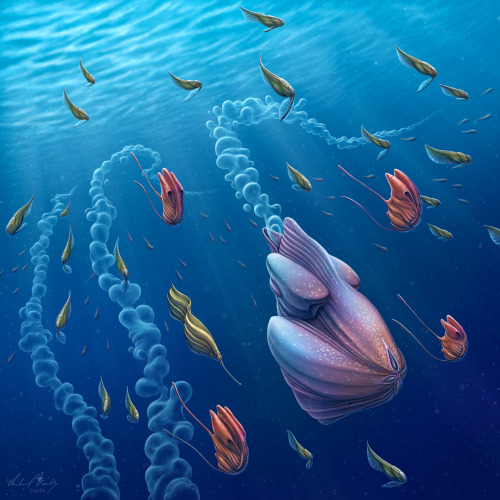
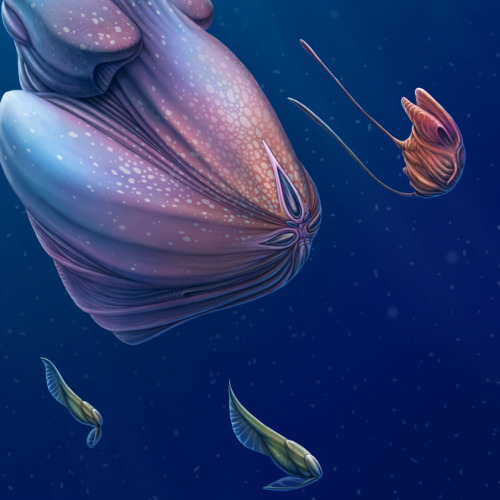
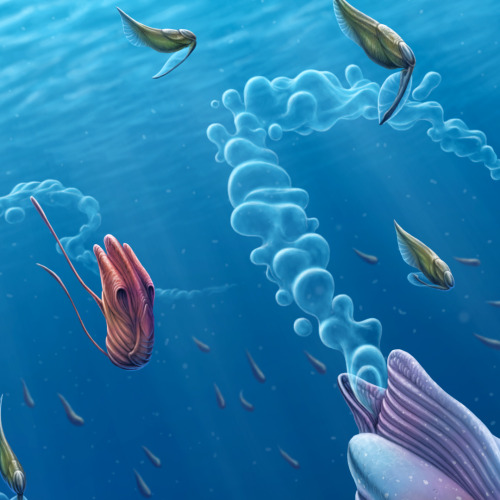
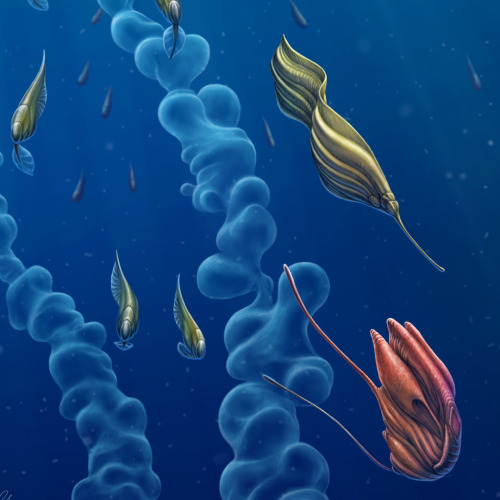
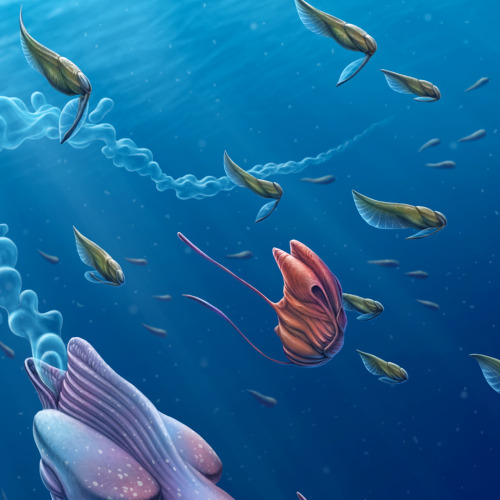
Back to the Depths
An entourage of opportunistic creatures accompanies the deep-sea behemoths during their brief ascent to the surface. Releasing their gelatinous strings of embryos here in the sunlight has a significant benefit - there's far more visibility. The swarm of followers are here in search of a quick meal in the form of the gelatin, which is full of valuable protiens and nutrients. After the feast however, the recipients of this apparent windfall become unwitting hosts for the behemoth's multitudinous offspring, which were embedded in the gel. Adapted to develop inside a wide variety of pelagic creatures, the young grow internally - and sometimes even on the surface of - their hosts until such time as they detach and sink back into the darkness. For most host species, this seems to be a mutually-beneficial symbiosis. At the beginning they receive a large and valuable meal, and usually incur very little detriment due to their temporary parasites. The young behemoths will hide in the dark depths for many years until attaining the size necessary to return to the light and repeat the ancient cycle again.

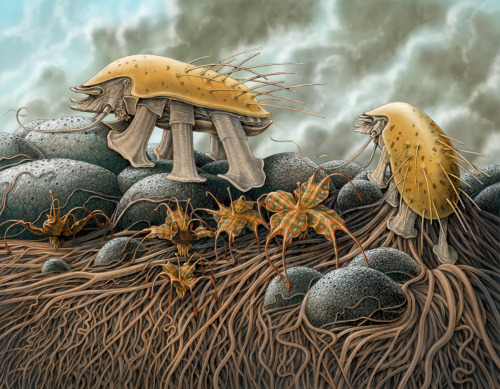
New Lands

Part of a color study for the next painting I plan to start this week.
-
 grigadf liked this · 10 months ago
grigadf liked this · 10 months ago -
 stuffedeggplants liked this · 1 year ago
stuffedeggplants liked this · 1 year ago -
 equibo liked this · 1 year ago
equibo liked this · 1 year ago -
 vernrot liked this · 1 year ago
vernrot liked this · 1 year ago -
 capivaracosmica liked this · 1 year ago
capivaracosmica liked this · 1 year ago -
 troythecatfish liked this · 1 year ago
troythecatfish liked this · 1 year ago -
 sugarcoatedcricket liked this · 1 year ago
sugarcoatedcricket liked this · 1 year ago -
 speculativ-evo liked this · 2 years ago
speculativ-evo liked this · 2 years ago -
 spycopoth liked this · 2 years ago
spycopoth liked this · 2 years ago -
 sablesablesablesable liked this · 2 years ago
sablesablesablesable liked this · 2 years ago -
 cozones-hellhole liked this · 2 years ago
cozones-hellhole liked this · 2 years ago -
 comradewubbles liked this · 2 years ago
comradewubbles liked this · 2 years ago -
 wolfdragon333 liked this · 2 years ago
wolfdragon333 liked this · 2 years ago -
 t4x1d3rmy liked this · 2 years ago
t4x1d3rmy liked this · 2 years ago -
 inkyvulture liked this · 2 years ago
inkyvulture liked this · 2 years ago -
 exobiotica reblogged this · 2 years ago
exobiotica reblogged this · 2 years ago -
 exobiotica reblogged this · 2 years ago
exobiotica reblogged this · 2 years ago -
 kangasauras reblogged this · 2 years ago
kangasauras reblogged this · 2 years ago -
 kangasauras liked this · 2 years ago
kangasauras liked this · 2 years ago -
 boypussydilf liked this · 2 years ago
boypussydilf liked this · 2 years ago -
 tentaclesmod liked this · 2 years ago
tentaclesmod liked this · 2 years ago -
 spyglassrealms liked this · 2 years ago
spyglassrealms liked this · 2 years ago -
 dekeract liked this · 2 years ago
dekeract liked this · 2 years ago -
 the-explorers-journal reblogged this · 2 years ago
the-explorers-journal reblogged this · 2 years ago -
 the-explorers-journal liked this · 2 years ago
the-explorers-journal liked this · 2 years ago -
 kingdeath000 liked this · 2 years ago
kingdeath000 liked this · 2 years ago -
 cerothenull liked this · 2 years ago
cerothenull liked this · 2 years ago -
 welcometoclasmia liked this · 2 years ago
welcometoclasmia liked this · 2 years ago -
 mistuhcheesyman liked this · 2 years ago
mistuhcheesyman liked this · 2 years ago -
 exobiotica reblogged this · 2 years ago
exobiotica reblogged this · 2 years ago




